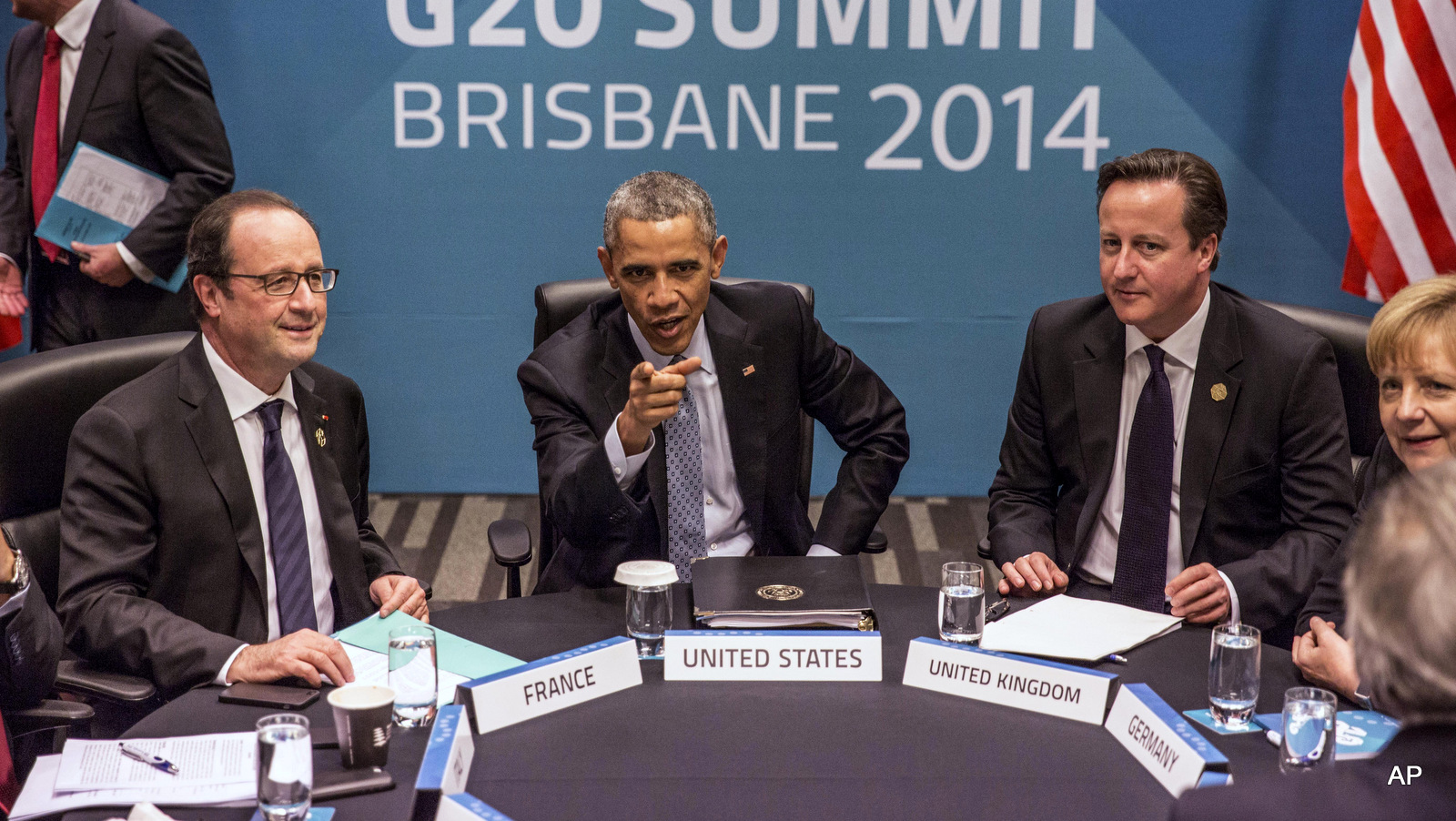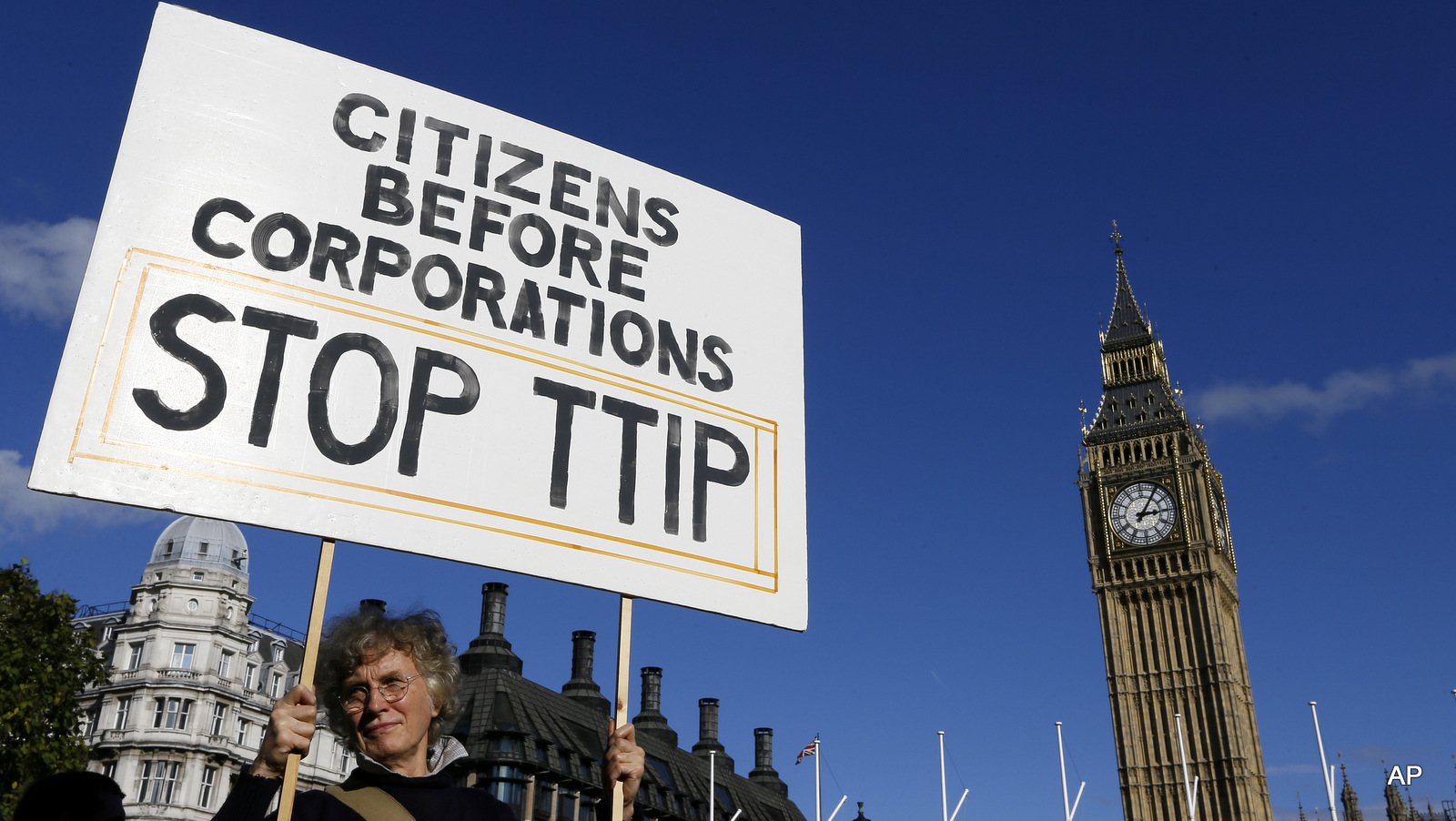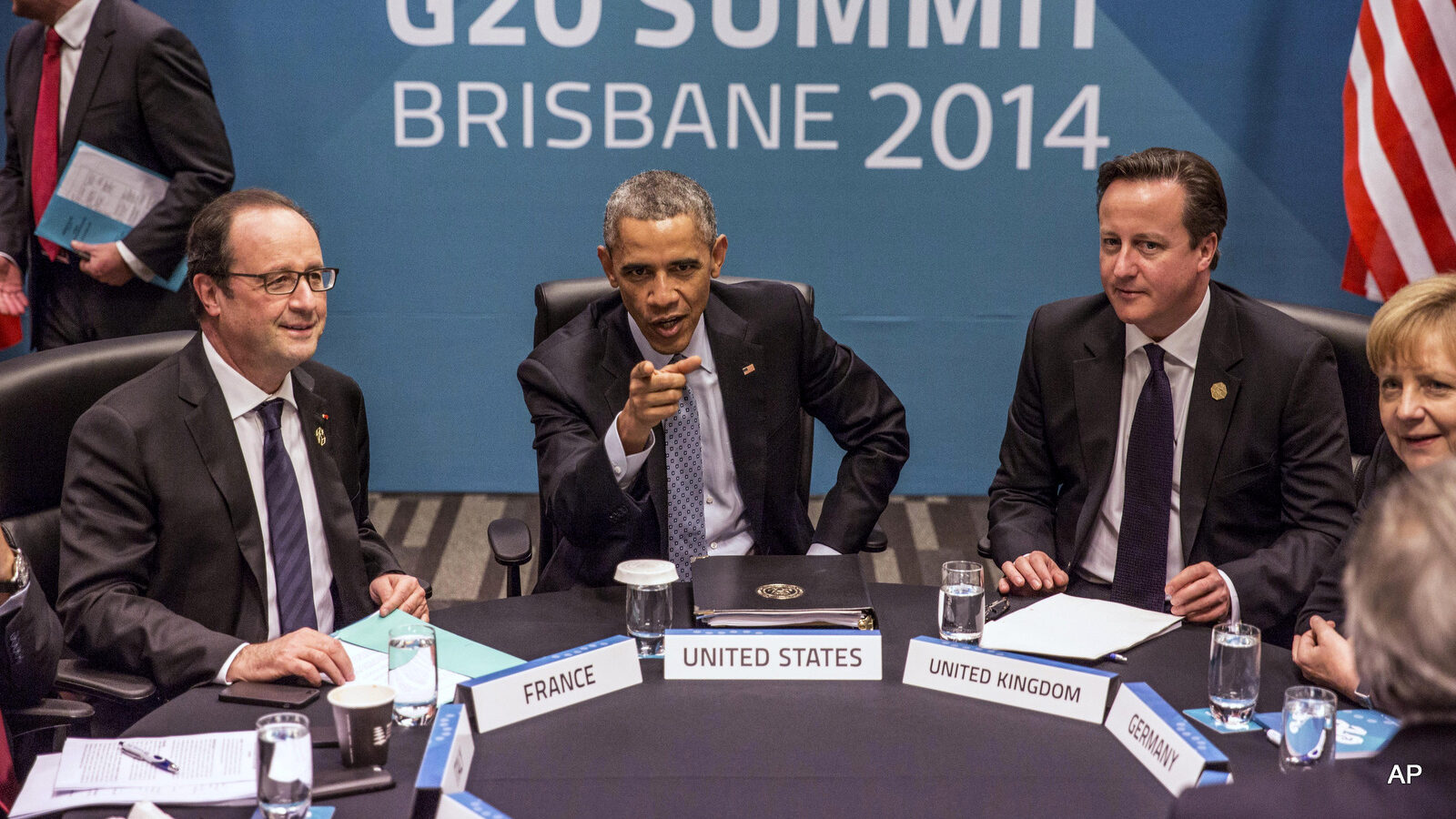 President of France Francois Hollande, U.S. President Barack Obama, Britain’s Prime Minister David Cameron and Germany’s Chancellor Angela Merkel attend the Transatlantic Trade and Investment Partnership (TTIP) meeting at the G20 the G-20 leaders summit in Brisbane, Australia, Sunday, Nov. 16, 2014.
President of France Francois Hollande, U.S. President Barack Obama, Britain’s Prime Minister David Cameron and Germany’s Chancellor Angela Merkel attend the Transatlantic Trade and Investment Partnership (TTIP) meeting at the G20 the G-20 leaders summit in Brisbane, Australia, Sunday, Nov. 16, 2014.
GLASGOW — Concerns are mounting in the United States and Europe over a controversial trade deal that critics say would remove safety standards on essential products like food and medicines, as well as dismantle financial regulations designed to prevent banks from creating another financial crisis.
Ahead of talks held last week in Brussels, campaigners on both sides of the Atlantic lobbied politicians for greater transparency over the Trans-Atlantic Trade and Investment Partnership (TTIP), also known as the Trans-Atlantic Free Trade Agreement (TAFTA). This deal, governments contend, would reduce barriers to free trade and bring enormous economic benefits to the U.S. and the 28 states comprising the European Union. But the secretive nature of the negotiations, ongoing since last July, has prompted concerns that the outcome will give more power to the rich at the expense of the poor.
“These are policies that should be determined in open, democratic venues, where we have a say,” a spokesperson for Public Citizen, a Washington-based think tank and consumer advocacy group, told MintPress News. “But a group of the largest U.S. and European banks, agribusinesses and other powerful industry groups want to rewrite these safeguards behind closed doors.”
The U.S. first announced its intentions to begin talks with Europe in an attempt to open up markets and boost economies in February 2013.
“[T]onight, I am announcing that we will launch talks on a comprehensive Transatlantic Trade and Investment Partnership with the European Union – because trade that is free and fair across the Atlantic supports millions of good-paying American jobs,” President Barack Obama said during his 2013 State of the Union Address.
The U.S.-EU goods and services trade value climbed to more than $700 billion in 2014, double the level of 2000. Further, the trans-Atlantic economy generates close to $5 trillion in commercial sales a year, and employs up to 15 million workers on both sides of the Atlantic, according to a 2014 report by the Center for Transatlantic Relations at Johns Hopkins University.
According to the Office of the U.S. Trade Representative, trade with EU nations each day generates around $2.7 billion, according to 2012 estimates, and the 28 EU countries ranked collectively as the second largest export market for America in 2013.
The Obama administration contends that amid the persistently fraught global economic situation, the trade deal and partnership would help economies by removing tariffs, cutting red tape and reducing restrictions on investment.
All this, America says, would make it easier for companies on both sides of the Atlantic to export goods and services and to invest.
Why is TTIP so controversial in the US?
U.S. companies already employ some 3.5 million people in the EU whose national governments believe more jobs would be created by bringing European standards and regulations in line with the U.S. The European Commission, the body negotiating on behalf of the EU, says companies would no longer have to produce different goods for U.S. markets, which would help them lower costs, and consumers would benefit from lower prices and a wider choice of products.
The closed-door talks have been ongoing since July. Cecilia Malmström, the trade commissioner of the European Commission, provided a progress update on Thursday. Outlining plans for future discussions and meetings to focus on particular issues, “for example on some of the regulatory issues,” she noted that talks held in Brussels last month constituted “the broadest set of discussions we’ve had since last summer.”
“I gave clear instructions to negotiators to step up the work and make as much progress as possible this year,” Malmström said.
However, critics of TTIP argue the deal could negatively impact hundreds of millions of people’s lives and also threaten the environment. They say the agreement would make it easier for multinationals to sue governments and could lead to significant slashes to environmental and safety standards.
According to Public Citizen, European agribusiness corporations want safety standards for milk removed under the proposed agreement because complying “is both highly cumbersome and expensive.” Further, EU banks oppose U.S. financial regulations enacted after the 2008 financial crisis to rein in Wall Street. They argue that these policies are “barriers to trade” that should be watered down.
Another area of concern is a proposal that TTIP will allow foreign corporations to drag sovereign governments before tribunals authorized to order compensation for public interest policies that affect profits.
Opposition in Europe
 A demonstrator holds a banner in Parliament Square in London, Saturday, Oct. 11, 2014. The demonstration was one of many across Europe against the Trans-Atlantic Trade and Investment Partnership, or TTIP.
A demonstrator holds a banner in Parliament Square in London, Saturday, Oct. 11, 2014. The demonstration was one of many across Europe against the Trans-Atlantic Trade and Investment Partnership, or TTIP.
Indeed, opposition to TTIP is mounting, reflecting concerns that the agreement could grant U.S. multinationals, or any company with U.S. investors, the power to sue the U.K. and Scottish governments if they ever attempted to take privatized health services back into public ownership.
Unite, Britain and Ireland’s largest union, recently stated that a consultation by the European Commission revealed “unprecedented” opposition among the British public. It also noted that one-third of 150,000 respondents to its survey were Britons concerned about the potential impact on the National Health Service (NHS), which offers free health care to the U.K.’s population and is viewed as one of the nation’s most prized institutions.
Unite also conducted its own survey of 17 seats held by the Conservative Party in England and found that voters opposed TTIP in every single area, including Prime Minister David Cameron’s seat in Witney.
Len McCluskey, the union’s general secretary, said: “The people of this country do not believe it is right for the NHS to be part of a US trade deal. Britain expects David Cameron to stand up for the NHS and use his veto in Europe to get the NHS out of TTIP.”
“The NHS unites this country, it is the single most important local issue for voters,” he continued. “The Prime Minister has cut himself adrift from public opinion by refusing to listen. Britain is demanding that he uses his veto.”
There is also massive resistance forming in Germany, Austria and France. The European currency crisis of the last five years has created fear of globalization and a mistrust of the corporate world and tax-avoiding multinationals. The mass surveillance scandals involving the U.S. National Security Agency have eroded faith in America and strained trans-Atlantic relations. Around 200 questions have been tabled in the German parliament on aspects of TTIP, reflecting the level of public concern there.
Global Justice Now Scotland (GJNS) is another critic of TTIP and one of 376 civil society organizations in Europe backing the European Citizen’s Initiative, a petition that’s garnered more than 1.5 million signatures to date.
GJNS says that 80 percent of gains in TTIP would come from the removal of non-tariff barriers to trade (NTBs), also known as standards and regulations, and that industry on both sides of the Atlantic have submitted requests calling for the removal of many of these NTBs. The U.S. Meat Export Federation, for example, has made it clear that the trade association may not even support the agreement if TTIP does not address the EU ban on hormone-injected beef:
“We wish to emphasize that an agreement that eliminates duties on beef and pork but leaves the EU’s hormone and ractopamine bans in place will be of limited value to the U.S beef and pork industries. This is why the way sanitary and phytosanitary (SPS) issues are dealt with will ultimately determine whether the US beef and pork industries are able to support the TTIP agreement.”
The U.S. negotiating team has indicated that tackling SPS issues remains a key priority in the deal.
Meanwhile, critics are concerned that the deal will have overwhelmingly negative consequences, especially in terms of where it could vest power.
“It’s not just a trade deal. It’s an unprecedented transfer of power away from democratically-elected governments toward transnational corporations,” Liz Murray, head of campaigns and policy at GJNS, told MintPress.
She added that governments who introduced these regulations could be challenged by international arbitration courts when companies have concerns over existing legislation.
Even future, more progressive legislation, she said, could be challenged by transnationals looking for compensation for lost profits. While they can’t change that legislation, they could sue governments who introduced it.
“So it’s not just about lowering tariffs between countries, it’s about potential change to regulations which have been put in place over the years to protect people’s health, the environment, workers’ rights and human rights,” Murray concluded.


